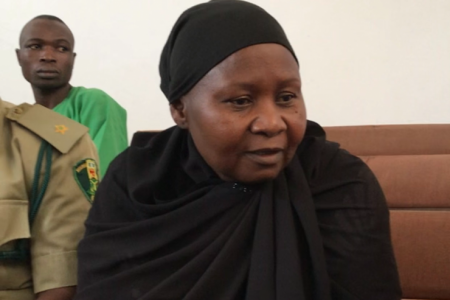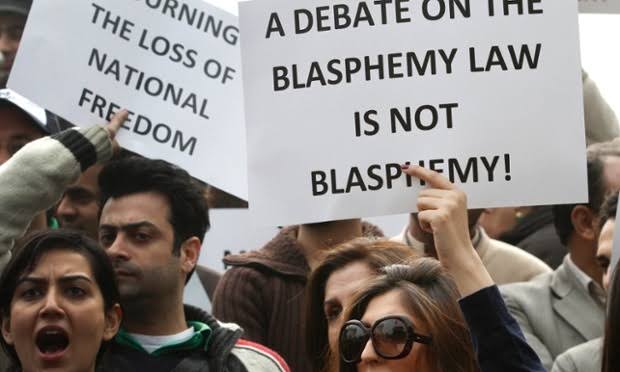By
Steven Kefas
The recent release of Mrs. Rhoda Jatau from prison is a welcome relief after the Christian mother of five spent 18 agonizing months jailed under Nigeria’s controversial blasphemy laws. However, her ordeal highlights the deep injustices that persist due to legal loopholes that allow religious extremists to carry out extrajudicial killings with impunity.
Mrs. Jatau’s only “crime” was allegedly sharing a video condemning the brutal murder of Deborah Samuel, a young Christian college student who was beaten, stoned and burned to death by Muslim mobs in Sokoto in May 2022 over unproven allegations of blaspheming the Prophet Muhammad. For daring to speak out against the merciless killing of Deborah, Mrs. Jatau was swiftly arrested and imprisoned in Bauchi state under the same problematic blasphemy statutes.

Mrs Jatau during a court session in Bauchi
The very existence of blasphemy laws in Nigeria’s constitution is concerning, as they violate basic human rights to freedom of speech and thought. But more alarming are the ways these laws enable radicalized mobs to become judge, jury and executioner, murdering anyone deemed to have transgressed Islamic teachings without any evidence or due process.
The blasphemy law is contained in section 204 of the Nigerian criminal code and has been a subject of debate and controversies over the years but the big question is; who determines what constitute blasphemy and in what circumstances should such be determined?
While the provision of section 204 stipulates a two year imprisonment for ‘anyone who commits an act any class of persons consider as public insult on their religion’, in northern Nigeria the punishment is instant execution according to Shariah law for anyone who is perceived to have committed blasphemy. Victims have often met with instant death by stoning without trial. This also contradicts the provisions of the Shariah law which allows blasphemers to be tried before execution.
“Any person who does an act which any class of persons consider as a public insult on their religion, with the intention that they should consider the act such an insult, and any person who does an unlawful act with the knowledge that any class of persons will consider it such an insult, is guilty of a misdemeanour and is liable to imprisonment for two years.” Section 204 of the Nigerian Criminal Code.
The Shariah law originally is supposed to be applicable to only Muslims but because of the ambiguity of the Nigerian constitution and by extension the legal system, non Muslims have often come under outright attacks and sometimes murder for accusations of blasphemy.
Deborah’s case is the latest in an ongoing string of tragic violence and loss of life suffered by religious minorities under blasphemy allegations. In 2007, Christian teacher Christiana Oluwatoyin Oluwasesin was beaten and burned to death for allegedly desecrating the Quran by her Muslim students in Gombe state. Over the past decade, multiple cases have emerged of Christians being brutally assaulted or killed over unfounded claims of insulting Islam. In 2016, 74 year old Bridget Agbahime was murdered and beheaded by Muslims in Kano for allegedly commuting blasphemy.
Yet seldom do the perpetrators face justice for so casually extinguishing innocent lives. Deborah’s murderers were arrested, but a judge ruled there was insufficient evidence to prosecute. By failing to fully enforce the law to protect victims, Nigeria’s institutions have fostered a culture of impunity that grants extremists a license to kill.
Nigeria’s constitution claims to uphold principles of justice, liberty and the sanctity of human life. But in allowing ambiguous blasphemy statutes to remain in place, it contradicts itself. These laws directly endanger the country’s Christian minorities living in the north and other vulnerable groups, enabling violence against the very people the government has a duty to protect.
The Middle Belt Times calls upon the Nigerian government to take active steps to prevent future tragedies unfolding as they did for Deborah and Mrs. Jatau. Blasphemy laws must be decisively repealed, religious extremism mitigated through education and dialogue, and institutions reformed to apply the law justly wherever malicious incidents occur.
Above all, the fundamental human rights and dignities of ALL Nigerians must be upheld, regardless of religious affiliation. Only then can the dangerous climate of fear and impunity stoked by blasphemy allegations be extinguished for good. The time is now to let reason, compassion and the rule of constitutional law prevail.
Steven Kefas is a Human Rights Defender, a Citizen Journalist and Minority Rights Advocates. He is a former Kaduna former prisoner of conscience now living in exile.




